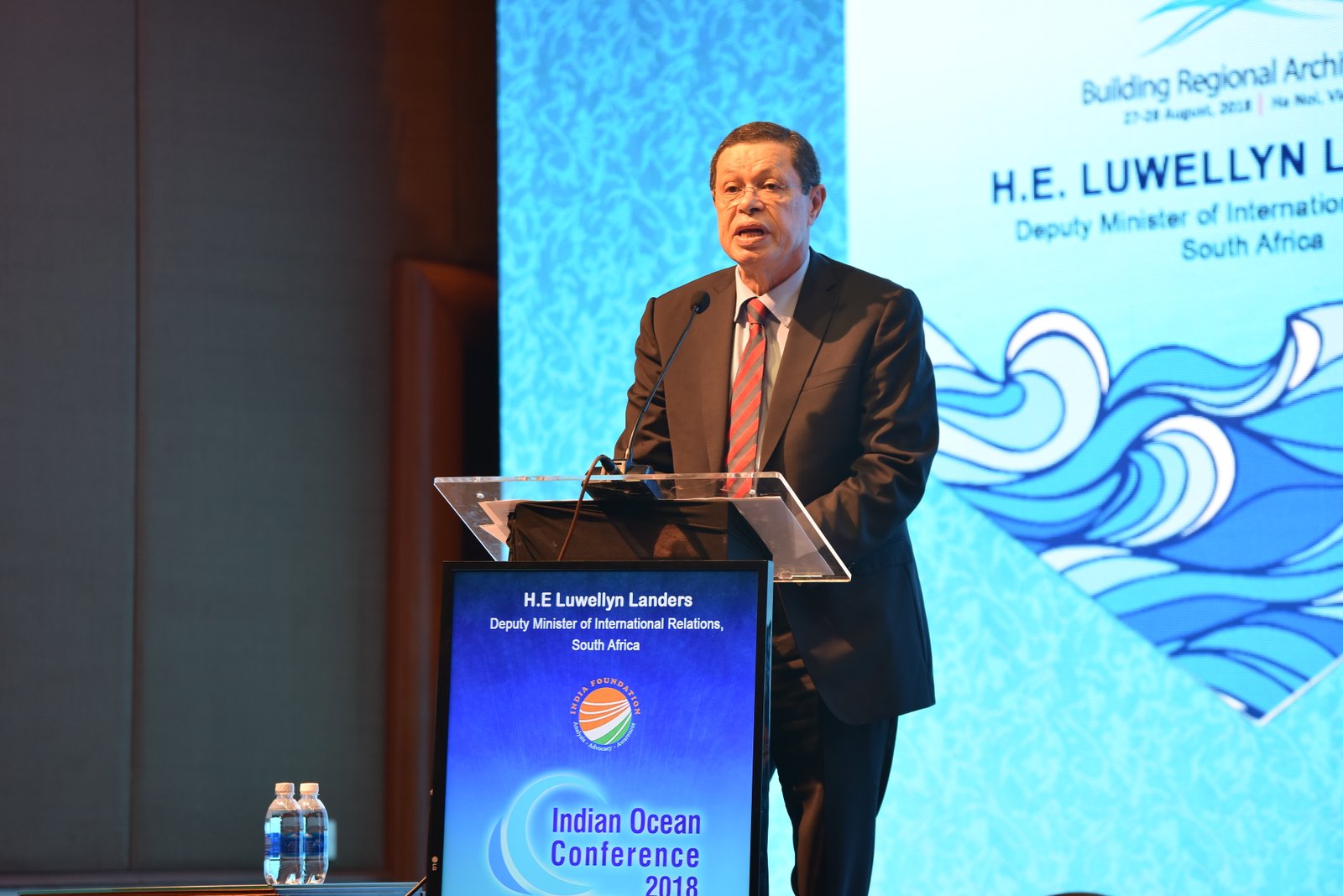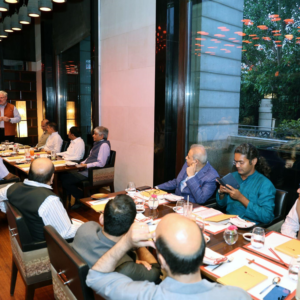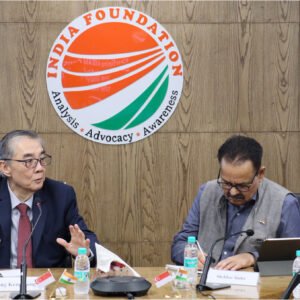The Indian Ocean Region (IOR) is of great strategic importance and value to the world in which we now find ourselves, and it is of utmost importance to safeguard and develop the region for the benefit of all its people. It is also argued that we need a new regional architecture to deal with the myriad security and socio-economic challenges facing the region. It is respectfully suggested that we have the necessary regional architecture to deal with these challenges and our discussions should be on the ways to strengthen this architecture to ensure that it is able to respond and deal with these challenges. In this regard, we would advance the view that any future regional architecture for the IOR must have the Indian Ocean Rim Association (IORA) at its core.
The year 2018 is historic for us as it is the centenary year of the birth of former President Nelson Mandela regarded widely as the founding father of IORA. The formation of the IORA has its roots in Nelson Mandela’s remarks in 1995 when he said, “The natural urge of the facts of history and geography should broaden itself to include the concept of an Indian Ocean rim for socio economic cooperation and other peaceful endeavors.” His vision became a reality two years later when in March 1997 the Indian Ocean rim for regional cooperation was formed. The IORA was launched in Mauritius with 14 member states. Today the association has 21 member states and seven dialogue partners.
It has become a strong and dynamic international body working to ensure an Indian Ocean rim that is safe, secure and sustainably developed. As you may know, South Africa assumed the chair of IORA in October 2017 with the theme of “uniting the people of Africa, Asia, Australia and the Middle East through enhanced cooperation for peace, stability and sustainable development.” This guiding theme for our chair ship until 2019 encompasses South Africa’s view that the IOR should be characterised as a region of peace, stability and development and that we view IORA as the pre-eminent regional organisation which would pursue this ambitious goal.
Maritime safety and security is a critical component and precondition for the economic activity and growth that is necessary for sustainable socio-economic development. As we move forward in this regard it is very important to recognise that we did not assume the chair in a vacuum; we are building on a solid foundation laid by other important strategic partners in the region that have led IORA recently such as Indonesia, Australia, India and Iran. We recall that during India’s chair of the association during 2011 to 2013, the work of IORA was streamlined and invigorated to become more focused and targeted towards the sustained growth and balanced development of the IOR and of member states and to create common ground for regional economic cooperation. IORA subsequently adopted the following 6 key priority areas.
1) Maritime safety and security,
2) Trade and investment facilitation,
3) Fisheries management,
4) Disaster Risk Management,
5) Academic and science and technology cooperation, and
6) Tourism promotion and cultural exchange.
During Australia’s chair in 2013 to 2015, the Association changed its name to the Indian Ocean Rim Association signifying this renewed vigor in the work of the association. Australia also enhanced the strategic focus of order through the adoption of the blue economy and women’s economic empowerment as agreed priority areas that cut across the aforementioned six key priority areas. During Indonesia’s chair in 2015 to 2017, the first IORA leaders’ summit to commemorate IORA’s 20th anniversary was held in Jakarta on 7 March 2017.
The summit’s adoption and signing of the Jakarta Concord elevated the association’s profile and stature to a significantly higher level and charted the way forward for the association into the next decade beginning with South Africa’s chairship. To this end the Jakarta Concord provides the highest levels of commitment with which to make the Indian Ocean a region of peace, stability and development through enhanced cooperation including but not limited to the six priority areas.
The IORA action plan provides a firm set of realistic and measurable commitments for the IORA’s current council of ministers to implement the Jakarta Concord and to take IORA forward in a more outcomes oriented manner. To this end the action plan provides short, medium and long term goals to inter alia promote marine safety and security in the region, enhance trade and investment cooperation in the region, promote sustainable and responsible fisheries management and development, strengthen academic science and technology cooperation, foster tourism and cultural exchanges, harness and develop the blue economy in the region and promote gender equality in the economic empowerment of women and girls to give effect to these targets.
IORA under South Africa’s chairship is strengthening its institutional mechanisms and bodies including the secretariat and is in the process of establishing new dedicated functional bodies to deal specifically with critical priorities in areas such as maritime safety and security, the blue economy, women’s empowerment and tourism. There is also a strong focus on enhancing trade and investment between IORA members, empowering the youth, ensuring the effective utilisation of resources such as water and fisheries and promoting research and development and innovation including through the Second International Indian Ocean expedition.
The focus on key priorities and the establishment of these new bodies will enable us to have a comprehensive set of work plans to deal with the challenges being faced in the region as well as to take advantage of the many opportunities that these areas bring to the fore. We are on a new and exciting trajectory and we look forward to working with our partners to explore these opportunities in a coherent and organized way. In this regard, we are broadening and deepening our engagement with the IORA dialogue partners to enhance their role in and support for the core objectives of the IORA action plan. The unprecedented interest in IORA amongst countries wishing to be dialogue partners is testament to the progress that we are making in taking our order forward as the pre-eminent international organization in the Indian Ocean.
Furthermore, South Africa is committed to deepening and strengthening IORA’s partnership with international and regional bodies such as the United Nations, the African Union, ASEAN, APAC as well as other important maritime bodies and symposia that focus on the Indian Ocean. We are particularly gratified that IORA has observer status at both the United Nations Generally Assembly and the African Union. And we look forward to strengthening our engagements with these important organs. In the case of the United Nations we are collaborating with agencies and bodies such as the Food and Agricultural Organization, Intergovernmental Oceanographic Commission of the United Nations Educational Scientific and Cultural Organization (UNESCO) for the exchange and dissemination of ocean data and information. We are in the process of finalizing a Memorandum of Understanding with the UN Institute for training and research. This cooperation and collaboration in support of the UN’s Agenda 2030 and the Sustainable Development Goals, particularly Sustainable Development Goal 14 which seeks to conserve and sustainably use the oceans, seas and marine resources for sustainable development.
Furthermore, as one of the many African countries of IORA, we are committed to working with the African Union in support of agenda 2063 towards a prosperous Africa based on inclusive growth and sustainable development.
In this regard, it is important to recognize that the EU has declared 2015 to 2025 as the decade of African seas and oceans. Likewise at the regional level in southern Africa, the Southern African Development Community or SADC is moving towards a strategy to develop a thriving maritime economy and to harness the full potential of sea based activities in an environmentally sustainable manner. IORA is an organization on the move and one that cannot and should not be ignored. My appeal is to look within the Indian Ocean region to the existing regional architecture such as IORA and find ways to work with it to strengthen and empower us to play a meaningful and strategic role. The IORA charter and the strategic vision encapsulated in the Jakarta Concord is an example that can be used to achieve this.
(This article is a summary of the speech delivered by Mr. Luwellyn Landers,
Hon’ble Deputy Minister of International Relations, South Africa on 28th August, 2018 at the
3rd Indian Ocean Conference, at Hanoi, Vietnam organised by India Foundation.)
(This article is carried in the print edition of January-February 2019 issue of India Foundation Journal.)




